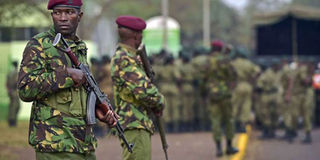Security teams did well during Obama visit, and should continue doing so

A soldier stands guard at the Moi International Sports centre in Nairobi on July 26, 2015. US President Barack Obama arrived on July 24 in the Kenyan capital Nairobi, making his first visit to the country of his father's birth since his election as president. AFP PHOTO
What you need to know:
- Mr Obama’s visit was a grand narrative showcasing how security preparations ought to be made on a daily basis, and not just because of important functions such as the Global Entrepreneurship Summit.
- In a country such as ours that lives under constant threat of attack by Al-Shabaab and other terrorist groups, every day should be treated as though the GES is going on.
The outcomes of US President Barack Obama’s visit to Kenya matched expectations where a key area the country has been struggling to address — security — received a direct boost. The Americans displayed an excellent orchestra of security and intelligence.
The question is whether Kenya can borrow a leaf from them.
Mr Obama’s visit was a grand narrative showcasing how security preparations ought to be made on a daily basis, and not just because of important functions such as the Global Entrepreneurship Summit.
In a country such as ours that lives under constant threat of attack by Al-Shabaab and other terrorist groups, every day should be treated as though the GES is going on.
Aside from Mr Obama’s excellent lecture on economic prosperity vis-à-vis the role of women and youth and efficiency in institutional governance and nation building, the presence of security agents and the use of sniffer dogs, cameras, sophisticated devices, air surveillance, and crowd control are things that Kenyans watched in awe, as though in a Hollywood movie, but which brought home to them what it means to have real security.
PHYSICAL FITNESS
So, what did our security teams learn? For starters, they can learn the importance of communication in intelligence gathering and the use of wireless and conventional communication devices to share information and coordinate activities during major public events.
They should also learn the importance of physical fitness in order to carry out these duties efficiently.
Therefore, our security agents have no option but to change tack regarding our homeland security apparatus and functions now that Kenyans know how to differentiate between mediocre and high level operations since they have seen for themselves how first-class security is handled.
They should demand immediate change.
Some would argue that it would be an expensive affair for Kenya to have the level of security commitment displayed by the Americans, that the country might lack the resources that can easily be mobilised to secure the most powerful man on earth, and that this was no ordinary activity.
While this may be the case, it is also true that perhaps this is where Kenya needs support from the US — resources, technical support, and training to lift our security threshold.
President Obama’s visit offered an excellent field course for our intelligence officers who worked alongside their American counterparts.
The American President said the US would stand shoulder to shoulder with Kenya to confront terrorism. Joint forces from the United States and Kenya working smoothly to secure his Kenyan visit perhaps mark the beginning of such collaborative efforts.
'HOTBED OF TERROR'
Technically, a sitting American president receives the same treatment regarding security irrespective of where he is, even in the US.
Perhaps what was exceptional in Kenya was that it was Mr Obama’s first trip since he became president and that it came amid controversy over the Western media’s inaccuracies about Kenya’s image with labels such as “hotbed of terror”, given the proximity and reality of terrorism still raw in our country’s collective memory.
However, the US helped Kenya to maintain security and law and order right in the heart of terrorism threats.
Nevertheless, the most important lesson, a peace and security issue and perhaps the highlight of Mr Obama’s visit, is related to radicalisation.
As the US president rightly observed, Kenya is a classic example of a country that can provide fodder for extremist ideas if we allow our differences and diversities to be exploited to tear the nation apart.
Unemployed youth, for example, have been easily radicalised because they cannot imagine a future where they will be economically liberated.
This is why Mr Obama’s decision to bring the GES to Nairobi and his “Yes Youth Can” message of hope is a direct blow to extremist ideologies in the country.
Security issues should be addressed by as many stakeholders as possible, including youth and women. Women played a central role in Mr Obama’s security detail.
Dr Ogenga is the head of the Communication, Journalism and Media Studies Department at Rongo University. [email protected]




